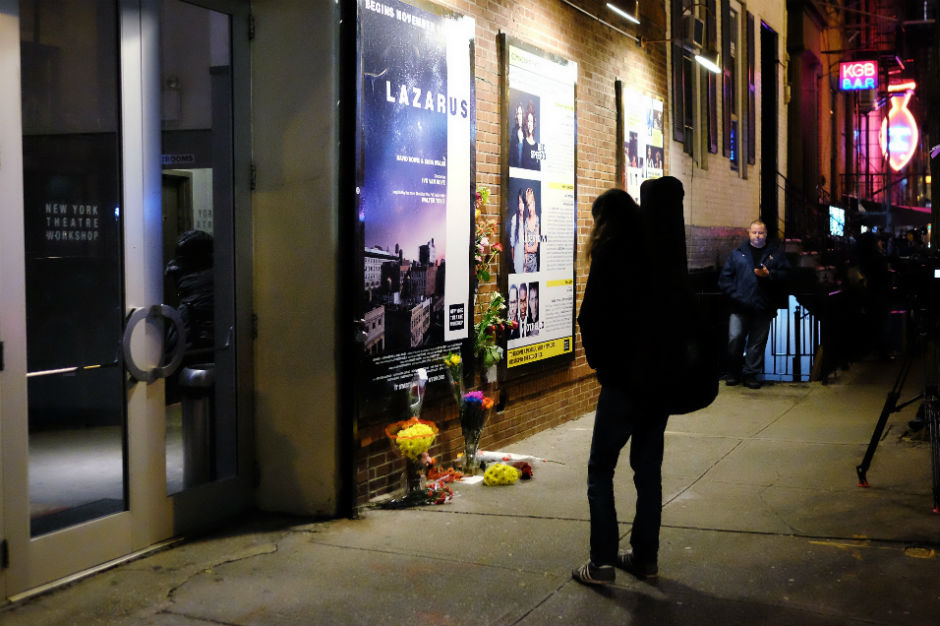A large portion of the crowd waiting in line outside the New York Theater Workshop last Saturday to see Lazarus held bouquets of corner-market flowers. They didn’t bring them to throw at the stage or to give to the performers at the stage door, but to leave at the impromptu shrine to David Bowie — who, of course, died at age 69 last week — under the show’s poster, complete with a bronze bust and notes to the Starman.
After a limited run that the NYTW extended to keep up with demand, Lazarus, Bowie’s final theatrical project, closed last night in the East Village, barely a ten-minute walk from the penthouse apartment on Lafayette Street he shared with his wife, Iman, for nearly 20 years. Co-written by Bowie and Once playwright Enda Walsh and directed by Ivo van Hove, the show centers on Bowie’s most singular film character, Thomas Newton (played by Michael C. Hall), an alien in human clothing trying to bring back water to his home planet in Nicholas Roeg’s 1976 film The Man Who Fell To Earth. Hall does a pretty great impression, building on the glam chops he built up during his run on Broadway as the titular character in Hedwig and the Angry Inch two years ago. In Lazarus, Newton’s still drinking gin and watching television, living with an assistant who reminds him a bit too much of a woman he knew long ago, and seeing a shifting cast of apparitions. Meanwhile, a man in a black suit lurks and stalks Newton and his friends, weaseling his way closer and closer to the penthouse armed with guile and a knife. And no, his name isn’t “Duke” or “Ziggy.”
The past 15 years or so have seen a glut of money-grab jukebox musicals: Elvis, Carole King, and ABBA have all been given the Broadway treatment, cashing in on a flimsy story written around the songs. Not that many people would be nervous about the prospect of Bowie adhering to a tried-and-true formula, but Lazarus is no Mamma Mia. There are scenes where the old songs only tangentially fit in the storyline of the show, but some of the old classics are reframed in a completely different context — like when Newton’s assistant (played by Cristin Milioti) sings “Changes” to her paranoid and old-fashioned husband, or when Newton sings a duet version of “Absolute Beginners” with his main apparition, a little girl named Elly (played by Sophia Anne Caruso). Other numbers seem right in character, like when Newton dances with geisha girls during “It’s No Game (Part 1)” from Scary Monsters, and sings on an empty stage projected with Berlin landmarks during “Where Are We Now” from 2013’s The Next Day.
Lazarus isn’t so much of a repackaging or greatest-hits delivery system, but a funereal retrospective. Languishing in his penthouse apartment on Second Avenue, Newton fades from public consciousness and never ages a day. Elly says that she can help him go back home to the stars, and she makes a masking tape rocketship on the floor of his apartment. In just one of many brilliant uses of cameras and projection by video designer Tal Yarden, the screen shows Hall lying stiff as a board on top of the rocketship, which he knows will become his coffin. He doesn’t want to die, necessarily, but his frustration with immortality forces him to find hope in his hallucinations. Many characters say goodbye in one way or another, and death looms heavily in the air. When viewed with ?, his final album released just two days before his passing, Lazarus seems a bit tame; not nearly as jarring or demanding. But both have lots to say about Bowie’s last few months on Earth, and in a way, they fit together as companion pieces.
Lazarus serves as David Bowie’s makeshift wake in miniature. To be fair, the small size of the New York Theatre Workshop and the Hamilton-level price gouging didn’t exactly make it open to the public, but there has been talk this past week of taking the play to a larger theater, perhaps even as far as the West End or Broadway. Its intimacy and blank staging may not let it go much longer, but ? did just hit No. 1, so Newton may be trapped up in his apartment for a few more months to come.
Exiting the show, people left the theaters to go back to the corner market, buy more carnations and daffodils, and make the trek down to Lafayette. They weren’t all dressed in black, nor did they ride in a police-escorted procession, but most of them were singing “Heroes” to themselves and to each other.





